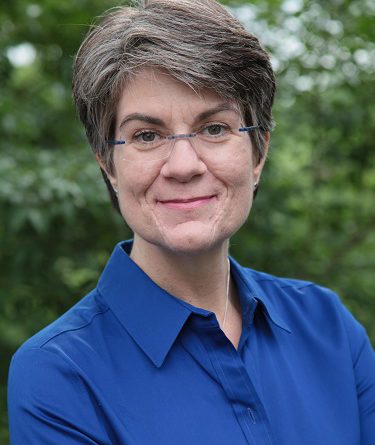The Great Commandment by Shannon Craigo-Snell
The Great Commandment, as formulated in the gospel of Luke, states, “You shall love the Lord your God with all your heart, and with all your soul, and with all your strength, and with all your mind; and your neighbor as yourself” (Luke 10:27 NRSV). The call is for integrated love that involves the whole person within a relational setting. Yet when I was in seminary, it seemed that students were sorted into vocational tracks that eschewed the goal of integration. This wasn’t an intentional aspect of the curriculum; there was no sorting hat or ceremony. Instead, the separation of students into distinct tracks appeared to be the natural fall-out of different career goals. Some students were headed for doctoral work to pursue the life of the mind. Others were headed to congregational ministry with its demands on heart and soul. A smaller number were headed into social work or activism, where strength and neighbor-love are central.
I enrolled with the intent to become a congregational minister, beginning the ordination process in the Presbyterian Church (USA) in 1992. Then I took a class in Systematic Theology and felt immediately at home. This was my calling, my place. When fellow students balked at taking Systematics, claiming they would not need it in the parish, I complained about the required preaching course, since clearly those skills would not be needed in my future work. I continued my studies in Systematic Theology—a very male-dominated field—and became a professor.
Over time, my intellectual pursuits led me to understand that while the Great Commandment demands integration of the whole person, the dominant philosophies in the Western hemisphere for the last 400 years have done the opposite, slicing and dicing the human person into different parts and pieces: heart and mind, body and soul, intellect and desire. The seminary sorting system was not a natural result of diverse vocations, but rather a reflection of the understanding of what it means to be human and what it means to know what was in vogue during the colonization of America and the founding of the United States. Furthermore, this dis-integrated view of humanity and knowledge has caused great harm, empowering systems of domination including racism and sexism.
Many female theologians choose to move away from Systematic Theology, seeing it as irredeemably complicit in such disintegrated thinking and oppressive structures. However, I am unwilling to abdicate the discipline of Systematic Theology, with all its richness and beauty, to those who embrace dis-integrated views. Instead, I push for integrated, whole-personed theology in both the form and content of my written work. I write about silence, emptiness, performance, and formation in books written for academic audiences and published by university presses. And I write in partnerships designed to cross the boundaries between academic theology and other forms of ministry, first with Rev. Dr. Shawnthea Monroe, a brilliant pastor, and second with Christopher Doucot, a life-long activist. My teaching is similarly shaped by a desire for integration of the whole self, rejecting traditional dichotomies between embodied, communal knowledge and challenging theoretical work.
Eventually, my emphasis on whole-personed knowledge and integration led me to pick up the ordination process where I had left off two decades before. I studied side-by-side with my students for ordination exams, attempted to learn Hebrew in my forties, and was ordained in the PC(USA) in the Spring of 2014.
Later that year, after the murder of Mike Brown, local organizers in Ferguson, MO asked clergy of various faiths to come and accompany them in protesting police violence against people of color. I had been teaching about racism and other forms of injustice in classrooms for years. I had also been involved in various modes of activism. In 2014, I was able to respond to this invitation as a systematic theologian, a teacher, an activist, and a minister. I travelled to Missouri with former students in August and current students in October. During the demonstration in October, hundreds of us participated in a familiar chant: “Show me what democracy looks like! This is what democracy looks like!” I heard the voice of one of my students behind me. David Wigger (now Rev. Wigger) had replaced “democracy” with “theology.” The activist with the megaphone leading the chant was nearby. I asked if I could make a request and relayed David’s new wording. The activist was skeptical that the crowd wouldn’t understand it, but I pleaded. He handed me the megaphone and I shouted, “Show me what theology looks like!” The crowd of clergy answered, “This is what theology looks like!” That chant—with David’s revision—was used by activists in Ferguson for weeks and months to follow. For me, it articulated and exemplified the whole-personed theology that I strive to live, and write, and teach.
The Rev. Shannon Craigo-Snell, PhD, is Professor of Theology at Louisville Presbyterian Theological Seminary. She is the author of four books and dozens of essays, articles, and book chapters. Craigo-Snell is also the mother of three children and a Minister of Word and Sacrament in the Presbyterian Church (USA).

